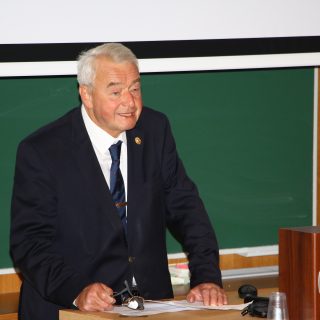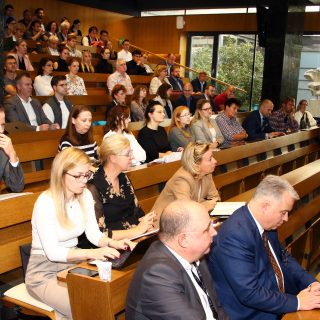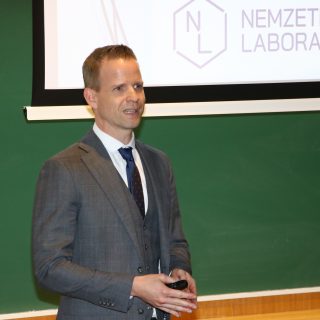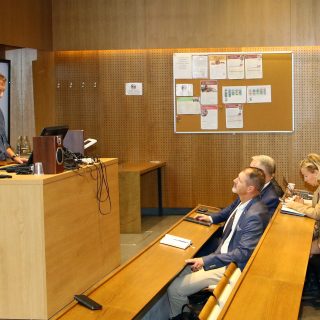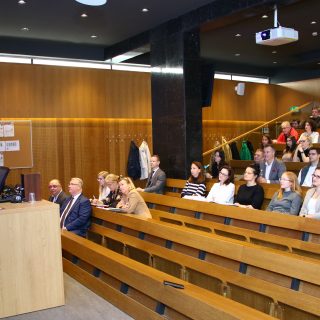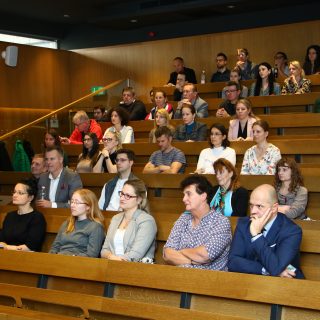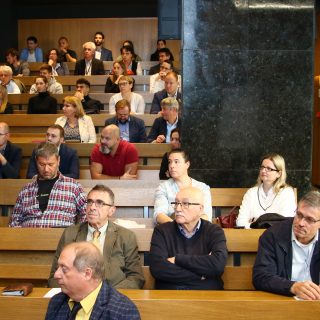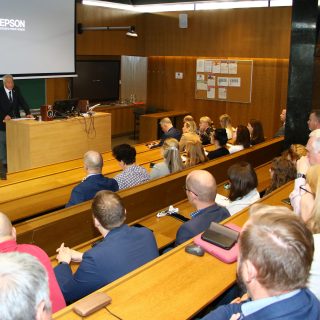On October 29, Prof. Dr Péter Sótonyi, Széchenyi Prize-winning university professor and rector of the University of Veterinary Medicine Budapest, opened the “Research afternoon – Conference on the research and innovation activities of the University of Veterinary Medicine Budapest.” In his speech, he emphasized that the university has risen in ranking lists over the past two years, partly due to its increased performance in innovation and publications—key factors in such rankings. He highlighted the university’s significant opportunity to establish the National Laboratory for Infectious Animal Diseases, Antimicrobial Resistance, Veterinary Public Health, and Food Chain Safety, which plays a leading role in the consortium.
Following, Dr Ákos Jerzsele, Vice-Rector for Research and Innovation and the project leader provided a detailed overview of the National Laboratory’s activities, underscoring the need for a partial shift in research focus. While maintaining the importance of basic research, there is also a need for applied research and experimental development, supported by the intellectual resources available at our university. Increasing scientific publications, strengthening international partnerships and grants, expanding industrial and academic networks, and filing intellectual property claims are central goals. After Dr Jerzsele’s report, Dr Csaba Pribenszky, head of the Innovation Office, presented the innovation activities at the University of Veterinary Medicine Budapest, highlighting three projects that have already reached the prototype phase following scientific validation.
Subsequently, the recipients of the university’s internal research grants presented their professional reports. Uniquely among universities, the University of Veterinary Medicine Budapest provides opportunities for research groups and young researchers to receive additional funding for their research through an internal grant program, with approximately 86 million HUF distributed. Researchers submitted their research reports by the end of September.
Dr Ervin Albert delivered a lecture on “Developing a diagnostic panel for studying streptococcus suis and other streptococci of veterinary significance, with a focus on domestic swine-origin streptococcus strains and prevention.” Emese Balogh reported on genomic and ecophysiological studies of a new evolutionary ecological model species, the wood frog. Prof. Dr. Sándor Cseh presented his research group’s results on assisted reproduction in domestic animals, focusing on oocyte collection using ultrasound-guided follicular aspiration and in vitro embryo production in mares and cows. His research group recently began collaborating with the fertility research group at Richter Gedeon pharmaceutical company. Dr Viktor Jurkovich gave a lecture on animal welfare and protection, while Dr Máté Mackei discussed the effects of acetamiprid and tebuconazole on redox homeostasis in the central nervous system of honey bees. Dr Krisztián Németh presented bile acid panel determination in healthy dogs and dogs with portosystemic shunts. Dr Gábor Mátis showcased research results on the development of primary cell models derived from the small intestine for testing anti-inflammatory agents. Dr Erzsébet Gere Pásztiné provided insights into the pharmacotoxicological characterization of metals and drug candidate compounds. Dr Gina Puska presented histological research on the role of the lateral septum in maternal adaptation, while Dr Petra Zenke measured the genetic diversity of fallow deer, roe deer, and mouflon populations in Hungary for forensic purposes and shared her findings at the research afternoon.
This event provided an excellent opportunity for attendees to become familiar with the research and innovation activities at the University of Veterinary Medicine Budapest, while researchers found it inspiring, encouraging collaboration and further reflection. Dr Ákos Jerzsele, Vice-Rector for Research and Innovation, encouraged everyone to share their research ideas and assured them that the university is always receptive to supporting innovative research and any products that may emerge from it.

